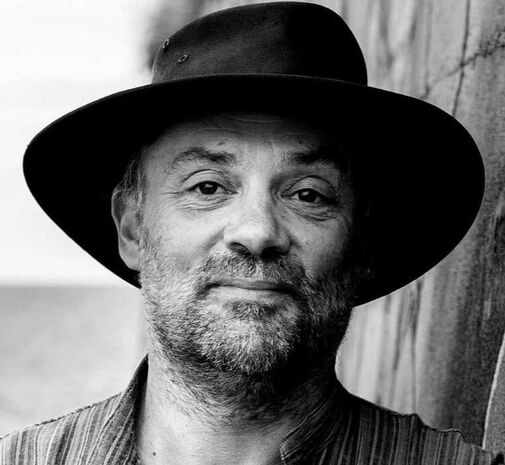
It gives me enormous pleasure to welcome Richard Dee onto the website today. Richard is a prolific multi-genre writer; a vocation he took up following retirement. To date, he has no fewer than 22 novels and collections of short stories under his belt.
Alex: Tell me a bit about yourself, Richard.
Richard: Richard Dee isn’t my real name, although it’s fairly close and I thought it looked better on a book cover.
I was born and grew up in Devon. When I was twelve, we moved to London, then to Kent, where I lived for forty years, before returning to my roots in Torbay. I left school at sixteen and joined the Merchant Navy as an apprentice navigator. I’m a qualified Master Mariner, as well as sailing on large bulk carriers, I also worked for twenty years as a ship’s pilot on the Thames. There I spent my time taking ships up and down the river and occasionally through Tower Bridge. I’ve also worked as an insurance surveyor, lockkeeper, and harbour master at the Thames Flood Barrier.
I had the first ideas for a story a long while ago. It actually came to me as a dream that kept repeating. In the end, I wrote it all down, hoping that it would go away and leave me alone. Instead of that, I just got more information, until it was obvious that I had enough material for a novel. The more I wrote, the more ideas I had. The rest, as they say, is history. In the last eight years, I’ve published over twenty novels and collections of short stories. And a textbook.
Alex: Tell me a bit about yourself, Richard.
Richard: Richard Dee isn’t my real name, although it’s fairly close and I thought it looked better on a book cover.
I was born and grew up in Devon. When I was twelve, we moved to London, then to Kent, where I lived for forty years, before returning to my roots in Torbay. I left school at sixteen and joined the Merchant Navy as an apprentice navigator. I’m a qualified Master Mariner, as well as sailing on large bulk carriers, I also worked for twenty years as a ship’s pilot on the Thames. There I spent my time taking ships up and down the river and occasionally through Tower Bridge. I’ve also worked as an insurance surveyor, lockkeeper, and harbour master at the Thames Flood Barrier.
I had the first ideas for a story a long while ago. It actually came to me as a dream that kept repeating. In the end, I wrote it all down, hoping that it would go away and leave me alone. Instead of that, I just got more information, until it was obvious that I had enough material for a novel. The more I wrote, the more ideas I had. The rest, as they say, is history. In the last eight years, I’ve published over twenty novels and collections of short stories. And a textbook.
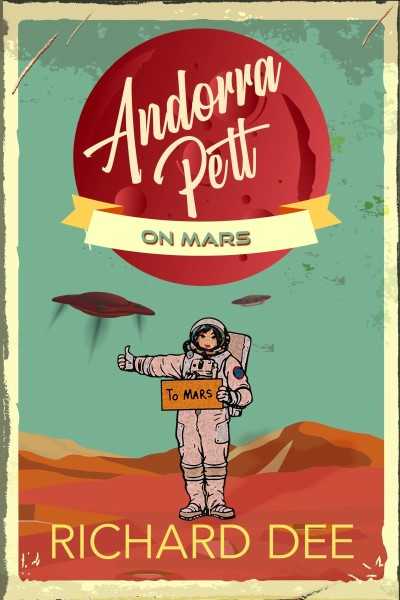
Alex: How would you describe your writing, and are there particular themes that you like to explore?
Richard: I write Science Fiction and Steampunk adventures, as well as chronicling the exploits of the solar system’s newest amateur detective, Andorra Pett. The tone of my work ranges from hard sci-fi and alternative Victoriana to light-hearted space-based crime novels.
As well as several ongoing series, I’ve also written a few standalone novels, including a fantasy adventure designed to appeal to fans of sword and sorcery quests.
I love to visualise new worlds and new ways of doing things, whether it's steampunk flying machines or growing crops in alien conditions, so much so that I wrote a textbook about my methods of world-building.
I guess my stories focus on power, its misuse, the underdog and his struggles. This doesn’t always mean the triumph of good over evil, because it’s not the way things are. We have to remember that, when we move out into the galaxy, we will take all our vices and our humanity with us. The human condition will play out in these new worlds as it does now, with the added bonus of a grander stage.
Alex: Are you a writer that plans a detailed synopsis or do you set out with a vague idea and let the story unfold as you write?
Richard: I write Science Fiction and Steampunk adventures, as well as chronicling the exploits of the solar system’s newest amateur detective, Andorra Pett. The tone of my work ranges from hard sci-fi and alternative Victoriana to light-hearted space-based crime novels.
As well as several ongoing series, I’ve also written a few standalone novels, including a fantasy adventure designed to appeal to fans of sword and sorcery quests.
I love to visualise new worlds and new ways of doing things, whether it's steampunk flying machines or growing crops in alien conditions, so much so that I wrote a textbook about my methods of world-building.
I guess my stories focus on power, its misuse, the underdog and his struggles. This doesn’t always mean the triumph of good over evil, because it’s not the way things are. We have to remember that, when we move out into the galaxy, we will take all our vices and our humanity with us. The human condition will play out in these new worlds as it does now, with the added bonus of a grander stage.
Alex: Are you a writer that plans a detailed synopsis or do you set out with a vague idea and let the story unfold as you write?
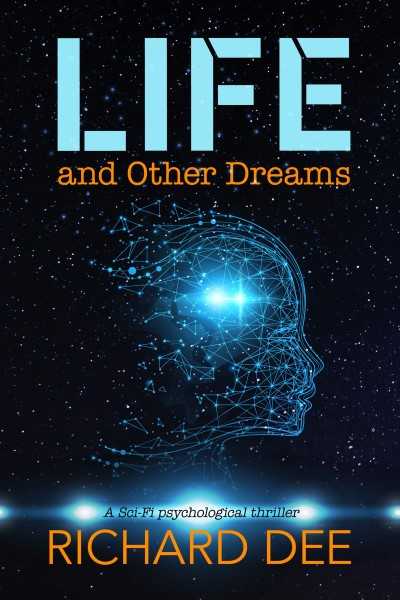
Richard: I don’t plan anything at all. I get an idea and then watch the story play out in real-time, as a film in my head. All I have to do is simply write down exactly what I see. I can slow the playback down or rewind it, to make sure I get all the details right. The one thing I can never do is fast forward. I see the action at the same time as a reader will.
When we reach a twist or the end of the story, I get as much of a surprise as I hope everyone else does. Because whoever is passing me this information is fickle, I will frequently get half a story and then the narration changes to another film. This means that I have a lot of half-finished work, patiently waiting for more information. There are about eight or nine sequels, prequels, spin-offs and new ideas in various stages of progress at any one time.
Alex: Tell us about your latest novel.
Richard: The Syk’m is a fantasy adventure, featuring a mythical version of the bogeyman and dealing with the results of years of superstition. There’s a simple question at its heart, what would happen if you met the thing you were brought up to fear? Especially if it wasn’t what you had been told to expect. Featuring magic and a journey between many worlds, The Syk’m is a tale of discovery and adventure.
When we reach a twist or the end of the story, I get as much of a surprise as I hope everyone else does. Because whoever is passing me this information is fickle, I will frequently get half a story and then the narration changes to another film. This means that I have a lot of half-finished work, patiently waiting for more information. There are about eight or nine sequels, prequels, spin-offs and new ideas in various stages of progress at any one time.
Alex: Tell us about your latest novel.
Richard: The Syk’m is a fantasy adventure, featuring a mythical version of the bogeyman and dealing with the results of years of superstition. There’s a simple question at its heart, what would happen if you met the thing you were brought up to fear? Especially if it wasn’t what you had been told to expect. Featuring magic and a journey between many worlds, The Syk’m is a tale of discovery and adventure.
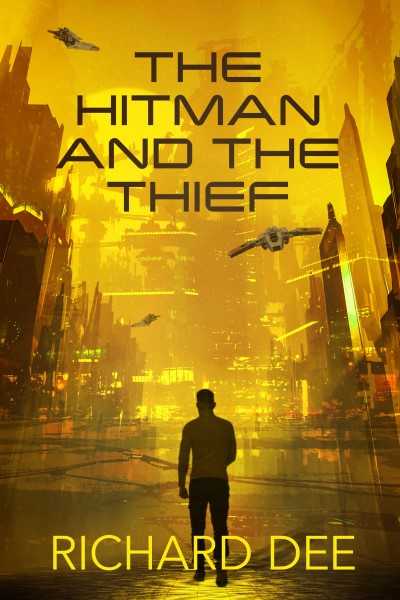
Alex: What was the first book you read?
Richard: The first one I clearly remember reading was Five on a Treasure Island. I was always a person who preferred to read and I raced through most of the classic children’s books. Later, when I was working on ships for long periods, I devoured anything I could find in the ship’s library. My tastes are eclectic, I’ll read anything that takes my fancy.
Alex: How much research do you do and what does it usually entail?
Richard: My research tends to take place after I’ve written the book. When I start to edit, I’ll go through and check that it all makes sense. At that point, I will look at what I’ve done in terms of world-building and technology and take it all apart to ensure that it’s based on good science. I try to blur the line where the truth ends and the fiction begins. In that way, while what I write might not be true, it all sounds true.
Alex: Do you ever base your characters on people you have encountered in real life?
Richard: Very much. A lot of the ideas that I get come from overheard conversations in coffee shops and situations that I see whilst I’m out and about. I suppose it’s just the way that my mind works but the films I see in my head tend to be populated by people I recognise. My amateur detective, Andorra Pett, is an amalgamation of my wife and my three daughters, which bit of her is based on who is a source of debate.
Richard: The first one I clearly remember reading was Five on a Treasure Island. I was always a person who preferred to read and I raced through most of the classic children’s books. Later, when I was working on ships for long periods, I devoured anything I could find in the ship’s library. My tastes are eclectic, I’ll read anything that takes my fancy.
Alex: How much research do you do and what does it usually entail?
Richard: My research tends to take place after I’ve written the book. When I start to edit, I’ll go through and check that it all makes sense. At that point, I will look at what I’ve done in terms of world-building and technology and take it all apart to ensure that it’s based on good science. I try to blur the line where the truth ends and the fiction begins. In that way, while what I write might not be true, it all sounds true.
Alex: Do you ever base your characters on people you have encountered in real life?
Richard: Very much. A lot of the ideas that I get come from overheard conversations in coffee shops and situations that I see whilst I’m out and about. I suppose it’s just the way that my mind works but the films I see in my head tend to be populated by people I recognise. My amateur detective, Andorra Pett, is an amalgamation of my wife and my three daughters, which bit of her is based on who is a source of debate.
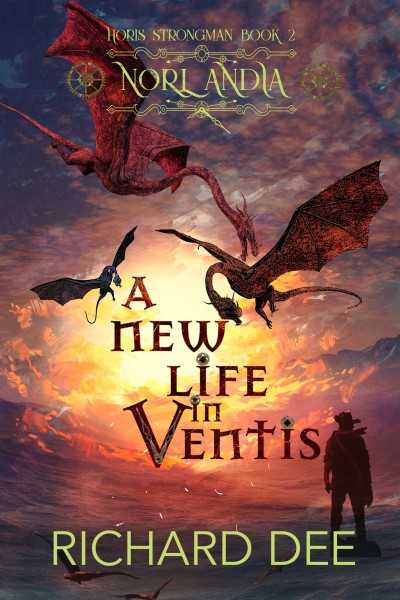
Alex: Which was the last book you read that blew you away?
Richard: That would be Lethal Ties by Helen Christmas. A taut psychological thriller, it gripped me right up to the last page.
Alex: How do you market your books?
Richard: I’m a late starter in the promotion game. Initially, I wrote and published as a hobby, it was only after I started to get a few good reviews and with some persuasion that I thought about actively trying to get more sales through promoting my novels. I run an author website, where I post regularly, with guests, book reviews, and my thoughts. As well as that, and a social media presence, I do a bit of advertising on Amazon and Facebook, with varying success. It’s a long haul, but with a backlist and plenty of new work, I’m starting to gain a reasonable following and regular sales.
Alex: What are your interests aside from writing? And what do you do to unwind?
Richard: I enjoy cooking, particularly baking bread and biscuits. When I first retired, I set up and ran an Organic bakery for a while, until it became too successful and required a major expansion/investment, which I was unable to organise. Reluctantly, I was forced to scale it back. I also do cross-stitch embroidery and love walking along the cliff path which is about ten minutes walk from my home.
Richard: That would be Lethal Ties by Helen Christmas. A taut psychological thriller, it gripped me right up to the last page.
Alex: How do you market your books?
Richard: I’m a late starter in the promotion game. Initially, I wrote and published as a hobby, it was only after I started to get a few good reviews and with some persuasion that I thought about actively trying to get more sales through promoting my novels. I run an author website, where I post regularly, with guests, book reviews, and my thoughts. As well as that, and a social media presence, I do a bit of advertising on Amazon and Facebook, with varying success. It’s a long haul, but with a backlist and plenty of new work, I’m starting to gain a reasonable following and regular sales.
Alex: What are your interests aside from writing? And what do you do to unwind?
Richard: I enjoy cooking, particularly baking bread and biscuits. When I first retired, I set up and ran an Organic bakery for a while, until it became too successful and required a major expansion/investment, which I was unable to organise. Reluctantly, I was forced to scale it back. I also do cross-stitch embroidery and love walking along the cliff path which is about ten minutes walk from my home.
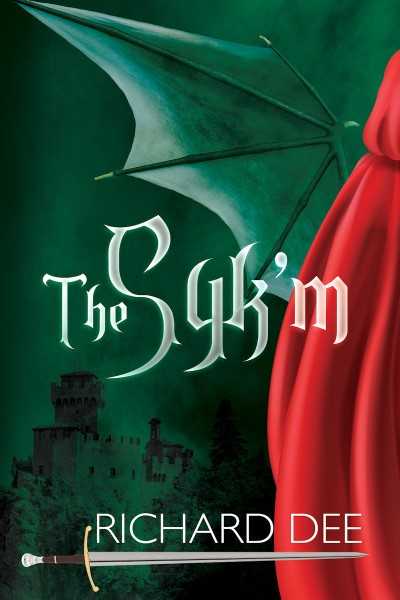
Alex: Which authors do you particularly admire and why?
Richard: I must admit that, as one myself, I have great admiration for Indie authors. The last few years have seen an explosion in good quality writing from outside the traditional route. There are Indie writers who are setting new trends and giving us all sorts of different ideas. Most of them are as good as any you will find. I read books by people who you might never have heard of, including but in no way limited to such authors as Helen Hollick, P.J. Reed, Helen Pryke and Michelle Medhat.
Alex: Thank you so much Richard for sharing your writing world with us. It's been absolutely fascinating and truly inspirational to learn that you have produced so much since your retirement. There's hope for us all!
Richard: Thank you Alex. It's been lovely talking to you.
Richard: I must admit that, as one myself, I have great admiration for Indie authors. The last few years have seen an explosion in good quality writing from outside the traditional route. There are Indie writers who are setting new trends and giving us all sorts of different ideas. Most of them are as good as any you will find. I read books by people who you might never have heard of, including but in no way limited to such authors as Helen Hollick, P.J. Reed, Helen Pryke and Michelle Medhat.
Alex: Thank you so much Richard for sharing your writing world with us. It's been absolutely fascinating and truly inspirational to learn that you have produced so much since your retirement. There's hope for us all!
Richard: Thank you Alex. It's been lovely talking to you.
